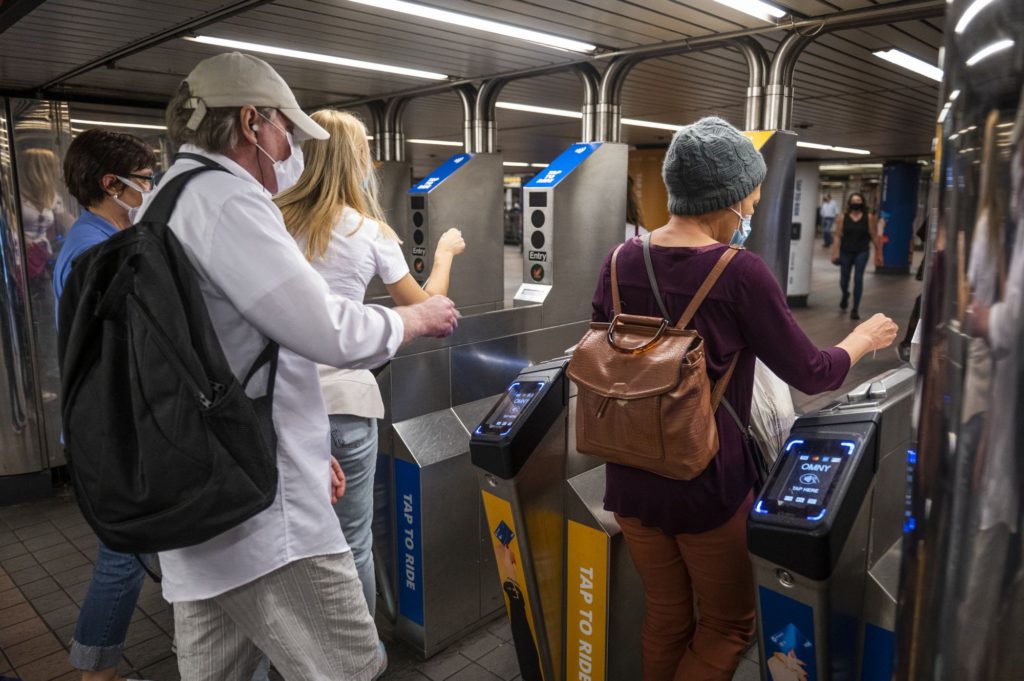New York’s Metropolitan Transportation Authority, the largest US transit system, approved a $19.2 billion operating budget for 2023 that anticipates a 5.5% fare hike, spending cuts and reduced service on some subway lines.
(Bloomberg) — New York’s Metropolitan Transportation Authority, the largest US transit system, approved a $19.2 billion operating budget for 2023 that anticipates a 5.5% fare hike, spending cuts and reduced service on some subway lines.
The spending plan has a $600 million deficit that MTA officials have said needs to be filled with additional state and city funds. The transit provider, a state agency that runs New York City’s subways, buses and commuter rails, needs to bring ridership back to 2019 levels, but working from home and violent attacks on the subway have kept some people off the system.
“We are counting on our partners in government to step up and deal with the financial strains that have been created by the loss of ridership,” Janno Lieber, the MTA’s chief executive officer, told reporters Wednesday after the agency’s monthly board meeting. “And we continue to emphasize that we’re looking to Washington, to Albany and to City Hall to help us figure out how to make sure we can maintain service and also deliver for our customers.”
Next year’s budget anticipates a 5.5% fare and toll hike, the first for the farebox since 2019 after the MTA delayed increases during the pandemic. The board will vote on the proposed fare boost next year after the MTA holds public hearings. That hike comes as the agency plans to reduce subway service on Mondays and Fridays and increase on weekends to better align with post-pandemic ridership trends.
NYC Subways May Trim Monday, Friday Service in Post-Covid Shift
While the MTA is seeking $600 million of additional funds in 2023, the agency projects its deficit to grow to $3 billion in 2025 as federal coronavirus aid to cover lost farebox revenue is set to run out. MTA officials have warned that without additional funding from the state, the agency will have to consider larger fare increases, service reductions and layoffs.
While the vote was unanimous, many board members said they do not support raising fares as many riders are struggling.
“New Yorkers deserve to live in a just and equitable city where transit is affordable,” Midori Valdivia, an MTA board member appointed by New York City Mayor Eric Adams, said during the meeting.
Lieber urged the members to push for MTA support with elected officials to help resolve the agency’s budget deficits.
“You can advocate, and that is consistent with your responsibilities,” Lieber said during the meeting. “Each of our responsibilities as fiduciaries for this organization and advocating for the players in determining whether that $600 million hole will be filled and the $1.2 billion hole in the out years will be filled, rising from there, is very much consistent with our duties at this board.”
The MTA supports economic activity in the region, getting people to work, school, shopping, appointments and nightlife. While system-wide ridership has come back steadily to about 60% of 2019 levels, the agency estimates that by the end of 2026 it will only reach 80% of pre-pandemic usage.
Resonating Message
There’s some hope the MTA will get additional support. A report released last week from a panel of business leaders formed by New York Governor Kathy Hochul and Mayor Adams called for a sustainable operating budget for the MTA that avoids outsize fare increases and service cuts.
“Our message that transit is essential seems to be resonating,” Lieber said during the meeting. “We’re getting positive signs from legislators.”
The agency can adjust its spending plan early next year and fix the $600 million gap as lawmakers work on the state’s budget for its fiscal year that starts April 1. MTA officials have been in talks with state legislators to allocate additional aid or find a new funding source for the transit system.
Another risk for the MTA’s budget is expected increases in labor costs. The 2023 spending plan factors in a 2% growth in wages as it will negotiate with its largest labor union, the Transport Workers Union Local 100 on a labor contract that’s set to expire on May 15. The MTA estimates an additional 1% increase above the 2% boost would cost $100 million per year.
The transit agency anticipates finding operating efficiencies that will bring $100 million of savings in 2023, with that amount increasing to more than $400 each year through 2026.
MTA’s board also approved $3.9 billion of potential bond and note borrowings in the next two years to finance infrastructure projects. The agency tends to approve such borrowings each December for the following year and authorize specific debt sales before the MTA goes to the capital markets.
“We need the MTA to continue to provide service that meets demand if we hope to continue our regional recovery and increase ridership to return to a fiscally sustainable path,” New York State Comptroller Thomas DiNapoli said Wednesday in a statement.
(Updates with MTA chief comment in the third paragraph.)
More stories like this are available on bloomberg.com
©2022 Bloomberg L.P.










